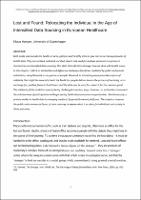Chapter 7 Lost and Found
Relocating the Individual in the Age of Intensified Data Sourcing in European Healthcare
Author(s)
Hoeyer, Klaus
Collection
European Research Council (ERC); EU collectionLanguage
EnglishAbstract
Both inside and outside the health services, patients and healthy citizens give rise to increasing amounts of health data. They are created, collected, curated, stored and used for multiple purposes in a process I characterise as intensified data sourcing. This data intensification changes how we deal with health issues. In this chapter I reflect on similarities and differences between data flows mediated by public and private institutions, using Denmark as my primary example. Denmark in interesting ways prescribes a form of solidarity that might be associated with We Medicine: people deliver data in the process of receiving, or in exchange for, publicly financed healthcare; and the data can be used for research for the common good. The solidarity of the model is currently being challenged in various ways, however, as authorities circumvent the voluntariness of participation and begin seeing health data as business opportunities. Simultaneously, a private market in health data is emerging mediated by privately owned platforms. The chapter compares the public and commercial forms of data sourcing to explore what is at stake for individuals and society in those processes.
Keywords
data sourcing; European healthcare; data flows; public institutions; private institutions; DenmarkDOI
10.1017/9781108590600.007ISBN
9781108590600Publisher
Cambridge University PressPublication date and place
2018Grantor
Classification
Medicine and Nursing
Data science and analysis: general


 Download
Download